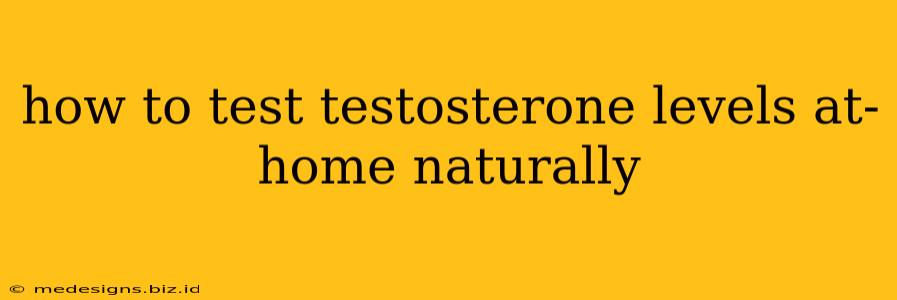Low testosterone can significantly impact your well-being, affecting everything from energy levels and muscle mass to mood and libido. While a blood test from your doctor provides the most accurate measurement, several natural methods can offer clues about your testosterone levels. It's crucial to remember that these methods aren't substitutes for a proper medical diagnosis, but they can help you understand your body better and potentially identify the need for professional medical attention.
Understanding Testosterone and its Fluctuations
Before delving into at-home testing methods, it's important to understand that testosterone levels naturally fluctuate throughout the day and across different life stages. Factors like age, stress, diet, and sleep can all significantly impact your testosterone production. Therefore, any at-home assessment should be viewed within the context of your overall lifestyle and health.
Factors Affecting Testosterone Levels:
- Age: Testosterone levels naturally decline with age, particularly after 30.
- Stress: Chronic stress can suppress testosterone production.
- Diet: A poor diet lacking essential nutrients can negatively impact hormone production.
- Sleep: Insufficient sleep disrupts hormone balance, including testosterone.
- Exercise: Both excessive and insufficient exercise can affect testosterone levels. Finding the right balance is crucial.
- Weight: Obesity is strongly linked to lower testosterone levels.
Natural Ways to Assess Your Testosterone Levels at Home
While you can't get a precise numerical reading at home, several indicators can suggest whether your testosterone levels might be low. These are not definitive tests, but rather observations that should prompt you to consult a doctor for proper testing.
1. Monitor Your Symptoms:
Pay close attention to any changes in your body and mind that might indicate low testosterone. These symptoms can include:
- Reduced Libido: A significant decrease in sexual desire.
- Erectile Dysfunction: Difficulty achieving or maintaining an erection.
- Fatigue and Low Energy: Persistent tiredness and lack of motivation.
- Decreased Muscle Mass: Noticeable loss of muscle strength and size.
- Increased Body Fat: Gaining weight, particularly around the abdomen.
- Mood Changes: Irritability, depression, or anxiety.
- Loss of Bone Density: Increased risk of fractures.
2. Track Your Morning Erections:
Morning erections (also known as nocturnal penile tumescence) are a natural indicator of testosterone levels. A consistent lack of morning erections could signal a potential problem. However, other factors like stress and sleep quality can also affect this.
3. Self-Assessment using Questionnaires:
Several online questionnaires exist that help assess potential symptoms of low testosterone. These are not diagnostic tools but can provide a starting point for discussion with your doctor. Treat these questionnaires with caution and always follow up with a professional medical opinion.
4. Observe Your Physical Changes:
Regularly monitor your body composition. A significant increase in body fat and decrease in muscle mass might suggest hormonal imbalances, including low testosterone. Take progress photos or measurements to track changes over time.
When to See a Doctor
If you're experiencing several of the symptoms mentioned above, it's crucial to schedule an appointment with your doctor. They can perform a blood test to accurately measure your testosterone levels and determine the underlying cause of any hormonal imbalances.
Do not attempt to self-diagnose or self-treat low testosterone. The information provided in this article is for educational purposes only and should not be considered medical advice. Always consult a healthcare professional for diagnosis and treatment. They can help develop a personalized plan to address any underlying health issues.
Boosting Testosterone Naturally (After Consulting a Doctor)
Once you have a diagnosis from your doctor, they may recommend lifestyle changes to help boost your testosterone levels naturally. These may include:
- Regular Exercise: Focus on strength training and maintain a healthy weight.
- Improved Sleep Hygiene: Aim for 7-9 hours of quality sleep per night.
- Stress Management: Practice stress-reducing techniques like yoga, meditation, or spending time in nature.
- Healthy Diet: Eat a balanced diet rich in fruits, vegetables, lean protein, and healthy fats.
- Supplements: Consult your doctor before taking any supplements, as some may interact with medications or have potential side effects.
By understanding the potential signs of low testosterone and seeking professional medical advice, you can take proactive steps to maintain your overall health and well-being. Remember that early detection and intervention are crucial for managing any hormonal imbalances.
